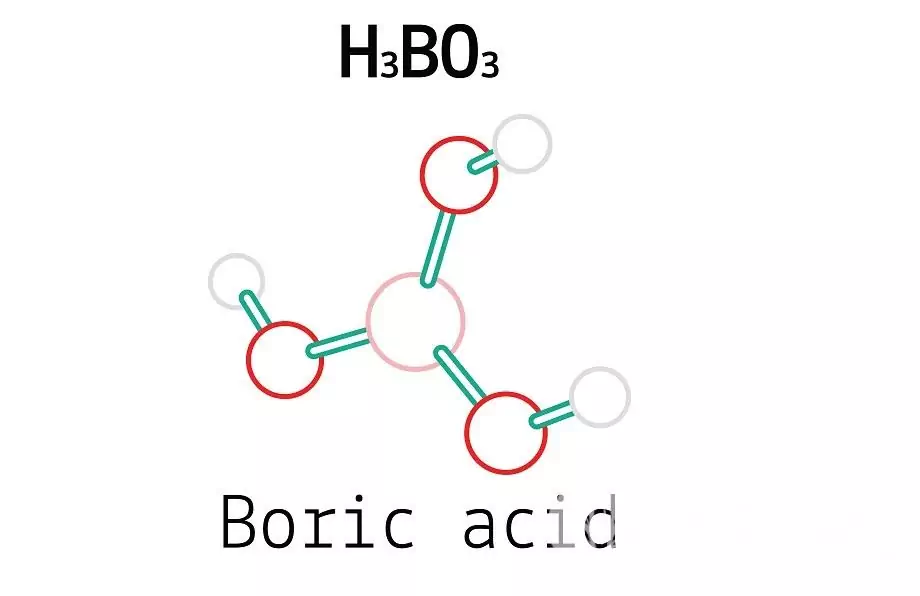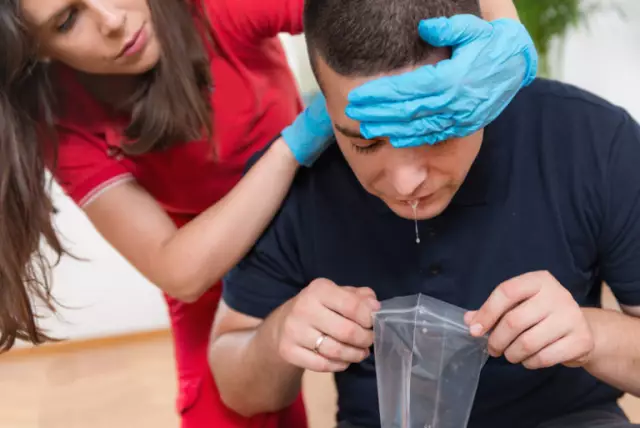- Author Rachel Wainwright wainwright@abchealthonline.com.
- Public 2023-12-15 07:39.
- Last modified 2025-11-02 20:14.
Boric acid poisoning
Boric acid is widely used in cosmetology, medicine and some industrial sectors. Its powder can be purchased at any pharmacy in the OTC department, and this creates the illusion of the safety of this chemical. In fact, boric acid is a toxic compound that has been banned for use in pediatric and obstetric practice since 1987 in Russia.

Source: depositphotos.com
How does the poisoning happen?
Boric acid poisoning occurs either when it is ingested orally or when the skin comes in contact with a large amount of a toxic substance.
Boric acid belongs to general cellular poisons that irritate tissues. It is excreted from the body unchanged with feces (10%), urine (85-88%) and in small quantities with sweat, salivary and lacrimal fluid. After about a day, the concentration of boric acid in the blood is halved.
Changes in organs and tissues during postmortem examination of those who died from boric acid poisoning are atypical and rather scarce. Minor areas of hyperplasia and necrosis are found in the spleen. The kidneys, liver and brain are edematous. The unexpressed changes in the renal glomeruli are revealed.
The lethal dose of boric acid for an adult is 20-40 g. Significantly lower doses (0.5 g per kilogram of body weight) are fatal in children.
Poisoning symptoms
Boric acid poisoning can be acute and chronic. For acute, damage to the tissues of the brain and mucous membranes is more characteristic. Clinically, this is manifested by the following symptoms:
- excruciating repeated vomiting, traces of blood in the vomit;
- diarrhea with blood;
- a strong feeling of thirst;
- skin rash, pronounced deep peeling of the skin;
- psychomotor agitation;
- tremor of the limbs;
- convulsions;
- coma.

Source: depositphotos.com
In addition, acute poisoning is always accompanied by impaired renal and liver function.
In chronic forms of poisoning, the symptoms of damage to the reproductive system and hematopoietic organs come to the fore:
- change in the picture of peripheral blood;
- hair loss;
- epileptic seizures;
- miscarriages;
- congenital fetal abnormalities;
- infertility.
First aid for boric acid poisoning
If boric acid gets on the skin and mucous membranes, they should be immediately washed with plenty of running water.
In case of oral poisoning with boric acid, if the victim does not vomit on his own, it is necessary to rinse the stomach, for which they give a few glasses of warm salted water to drink, and then irritate the root of the tongue. The procedure is repeated until the particles of the previously eaten food are no longer detected in the vomit.
In the absence of diarrhea, a saline laxative, such as magnesium sulfate solution, should be taken.
When is medical attention needed?
In case of boric acid poisoning, an ambulance team should be called immediately, since the earlier therapy begins, the better the prognosis.
There are no specific antidotes for boric acid. To accelerate the elimination of a toxic compound from the body, forced diuresis, exchange transfusion, peritoneal dialysis, hemodialysis are shown.
To maintain the proper level of blood pressure and renal blood flow, intravenous infusion of saline and colloidal solutions is performed. If necessary, Norepinephrine, Dopamine and glucocorticoid hormones (Prednisolone, Dexamethasone) are administered. Glucocorticoid hormones not only help maintain blood pressure, but also reduce the risk of irreversible changes in kidney tissue.
A decrease in plasma alkaline reserve causes the development of acidosis. Transfusion of THAM solution or sodium bicarbonate is indicated to correct this condition.
Possible complications
Severe poisoning is life threatening. They are especially dangerous for children in the first months of life, in view of the immaturity of the body.
Boric acid intoxication causes irreversible changes in kidney tissue, which causes the formation of chronic renal failure. Treatment consists either in systematic hemodialysis sessions for life, or in kidney transplantation.
Boric acid poisoning in pregnant women leads to tissue damage to the embryo or fetus, which causes serious developmental defects, and sometimes becomes the cause of intrauterine death (spontaneous abortion).
Prevention
For industrial boric acid poisoning in enterprises, careful monitoring of compliance with safety measures must be carried out.
At home, it is advisable to abandon the use of boric acid, replacing it with other, less hazardous substances. As an antiseptic, it is more effective to use aqueous solutions of potassium permanganate or chlorhexidine, 3% hydrogen peroxide solution, and it is better to entrust the SES specialists to the fight against domestic insects.
In no case should the nipples of the mammary glands be treated with a boric acid solution during breastfeeding. It is also forbidden to treat a child's oral cavity with boric acid for the purpose of treating or preventing thrush.
If, nevertheless, boric acid is used at home, then its powder and solutions should be stored out of the reach of children. The package must have a label with the name of the drug and an indication of the method of application.
YouTube video related to the article:

Elena Minkina Doctor anesthesiologist-resuscitator About the author
Education: graduated from the Tashkent State Medical Institute, specializing in general medicine in 1991. Repeatedly passed refresher courses.
Work experience: anesthesiologist-resuscitator of the city maternity complex, resuscitator of the hemodialysis department.
The information is generalized and provided for informational purposes only. At the first sign of illness, see your doctor. Self-medication is hazardous to health!






